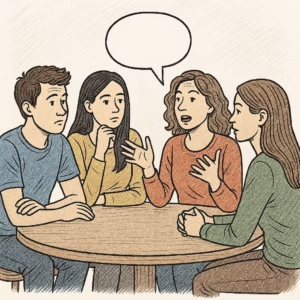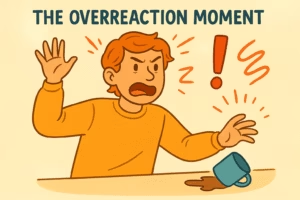In conversations, communication is a two-way street—but for individuals with ADHD, navigating this street can sometimes feel like driving without brakes. Interrupting or talking over others isn’t always about rudeness; more often, it’s a symptom rooted in impulsivity and fast-paced thinking. In relationships—whether romantic, familial, or professional—this habit can create misunderstandings and emotional distance if left unaddressed.
Why Do People with ADHD Interrupt?

ADHD affects the brain’s executive function, which includes impulse control and working memory. When someone with ADHD interrupts, it’s usually not because they want to dominate the conversation—it’s because they’re trying not to lose a thought or feel an urgent need to express an idea before it slips away. This can be especially common during emotionally charged conversations or when a topic sparks interest.
According to the NHS ADHD Symptoms, interrupting is listed among key behavioural characteristics. The same urgency that helps individuals jump into creative tasks or solve problems quickly can also lead to blurting out answers or finishing others’ sentences.
The Impact on Relationships
Constant interruptions can leave conversation partners feeling unheard or dismissed. Over time, this might lead to resentment or withdrawal. In romantic or familial relationships, this dynamic can be particularly harmful—especially if the other person perceives the interruptions as a lack of respect or empathy.
When working with clients at ADHD-Coaching.uk, I often hear how difficult it is to balance fast-paced thinking with deep listening. Many partners express a desire to feel truly heard, not just responded to.
Strategies for Managing the Urge to Interrupt
Here are a few practical strategies to help manage impulsive interruptions:
1. Practice “Wait 3 Seconds”
Pause after someone finishes speaking. Mentally count to three. This tiny delay can reduce impulsivity and improve conversational rhythm.
2. Use Visual or Physical Reminders
Place a sticky note that says “Listen” on your desk or computer. Wear a reminder bracelet or ring. Visual cues help reinforce mindful listening.
3. Jot Down Your Thoughts
If you’re afraid of forgetting something important, quickly jot it down instead of saying it out loud. This technique helps preserve the thought and keeps the focus on listening.
4. Apologize and Reset
If you do interrupt, it’s okay! Acknowledge it: “Sorry—I jumped in. Please finish what you were saying.” Small, respectful repairs can go a long way.
5. Practice Active Listening
Try to summarize what the other person just said before you respond. It shows attentiveness and helps you stay grounded in their perspective.
When to Seek Help

If interrupting is significantly impacting your relationships, working with an ADHD coach or therapist can provide personalized strategies. Through targeted support like our ADHD Relationship Coaching, individuals can learn to navigate communication hurdles with more ease and empathy.


